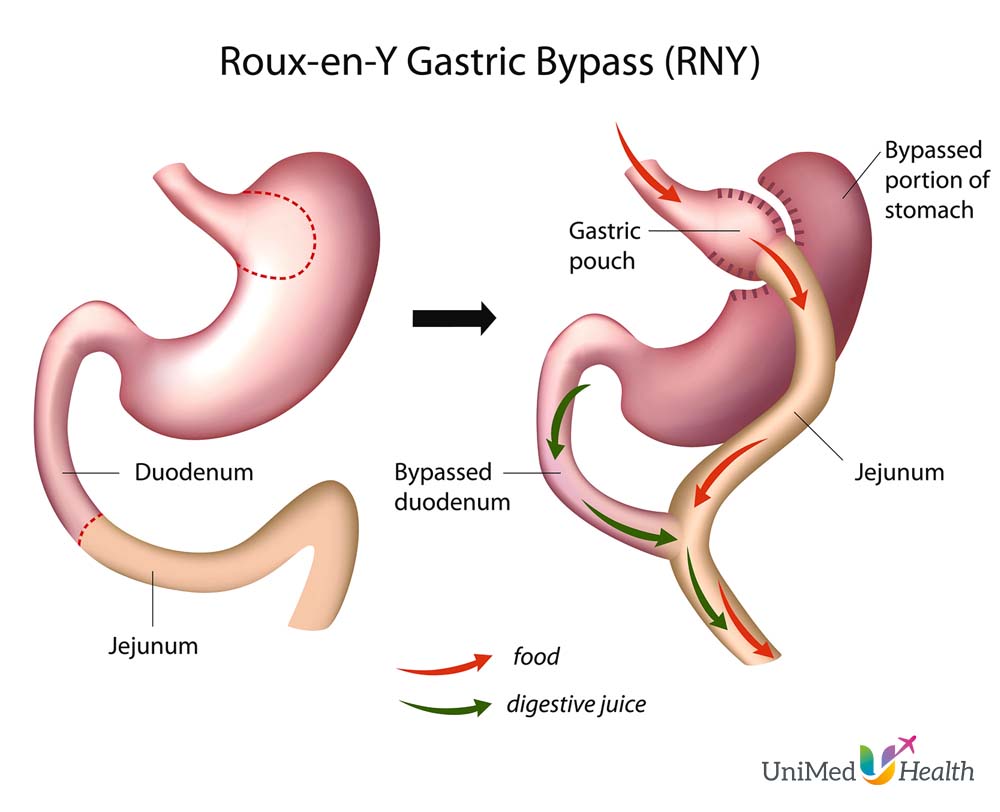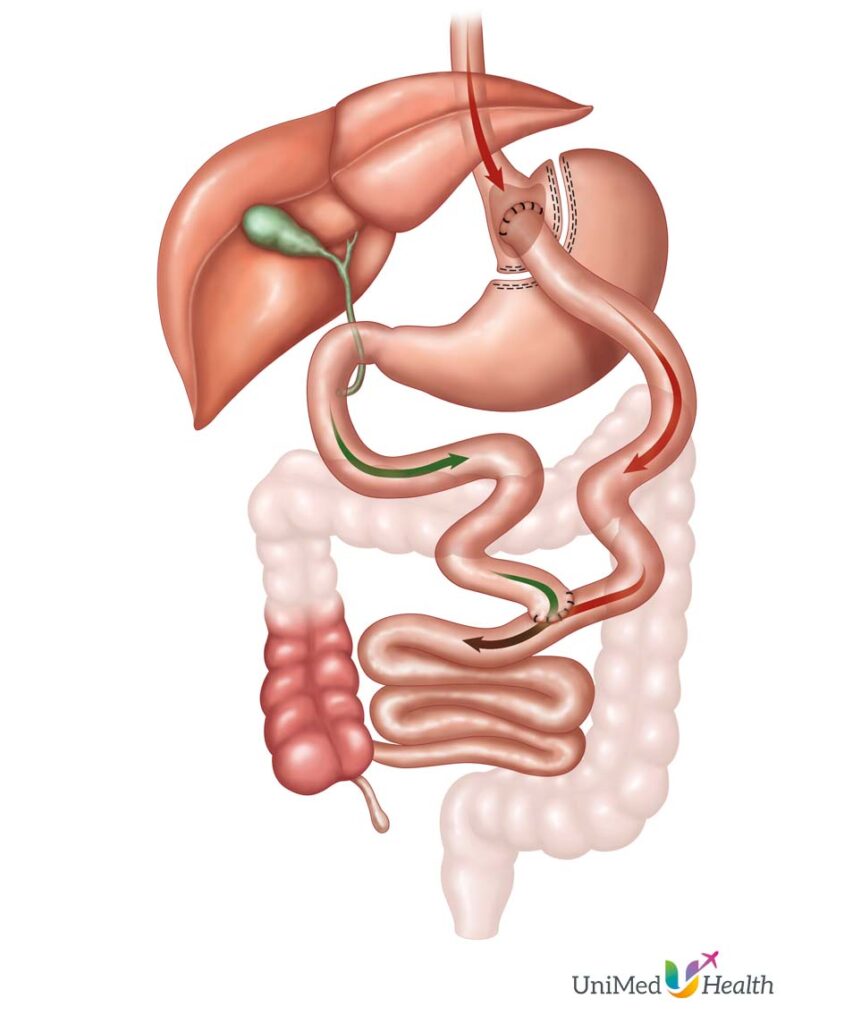Gastric Bypass Surgery (Roux-en-Y)
Gastric bypass, also called Roux-en-Y gastric bypass (RYGP) surgery, is one of the most used bariatric surgical procedures. In 2016, an estimated 19% of bariatric surgeries were performed using this method. Known as the gold standard method of bariatric surgery, this surgery is both restrictive and malapsorptive. It helps patients lose weight in a short time and solve their obesity-related problems.
The surgery takes place under general anesthesia. The surgeon usually performs the surgery with the laparoscopic method (closed surgery) in terms of patient comfort and considering fast recovery times. However, in some cases, it is necessary to do it openly.
During the surgery, a small pouch is created in the upper part of the stomach. An average of 90 percent of the stomach is disabled. The newly formed pouch is combined with the lower part of the small intestine. Thus, most of the stomach and the first part of the small intestine (duodenum) is bypassed by the digestive system. With the biliopancreatic limb, bile acid and pancreatic secretions, which are necessary for digestion, are emptied into the small intestine. As explained above, it is a more technical operation than sleeve gastrectomy and gastric balloon surgery.

How does gastric bypass work?
- The shrinkage of the stomach into a small pouch restricts the amount you can eat, and you’ll feel full faster and stay fuller for longer.
- Bypassing part of your small intestine means you will get fewer calories from food.
- According to the studies, there was a significant decrease in the level of Ghrelin, which is known as the appetite hormone, in patients after gastric bypass.
- Intestinal hormones such as GLP‑1 and PYY, which have positive effects on weight loss and metabolism, are increased in patients after gastric bypass.
How long will it take?
Gastric bypass surgeries take an average of 2-4.5 hours. The duration of the operation may be prolonged in the presence of complications. Although the time varies according to the skill of the surgeon, the high BMI index of the patient also causes the surgery to take a long time due to the laparoscopic surgery technique. According to our experience in our clinic, it takes about 2 hours.
Length of stay in hospital
The average stay is 3-5 days. If complications occur in the postoperative period, although rare, this period may be prolonged.
Recovery Time After Bariatric Surgery
You can also check out the bariatric surgery section for this. It takes an average of 2 weeks for patients to return to their working life. The time required for full recovery is 6 weeks. The patient should not do heavy lifting or heavy exercises during this time. The patient can do exercises such as walking and cycling to accelerate the recovery process in the post-operative period.
Weight Loss After Gastric Surgery
Results after gastric bypass are variable. For example, according to one study, the loss of excess weight at the end of 3 years is 71%, and 65% according to another study. The expected weight loss for patients is generally between 65% and 80%. Patients generally lose most of their excess weight within the first year after surgery. In general, the rate of weight loss in patients with gastric bypass is higher than in other bariatric operations. Losing weight depends on many factors. In the postoperative period, which we have mentioned before, your determination and adherence to the plan will affect your weight loss process. You can go well above the average or stay below the average.

Benefits of Gastric Bypass Surgery
It is seen that many diseases such as Type 2 Dm, sleep apnea, high blood pressure, osteoarthritis, migraine, high cholesterol, and depression are in remission after bariatric surgery, especially after gastric bypass. Perhaps the most important benefit of gastric bypass is the treatment of diseases with high mortality.
What About After Gastric Bypass?
This part is perhaps the most important. We must manage this process with great determination. You need a strict diet plan and lifestyle changes following your doctor’s advice. Do not forget that as UNIMED, we will be with you during this period. Below you will find advice that will make your life easier after gastric bypass
- Below you will find some advice to make your life easier after a gastric bypass.
- Start walking as fast as possible.
- When creating your diet, make sure that there are 3 meals and do this with a dietitian.
- Include protein, carbohydrates, and fats. It is also necessary to include vegetables and fruits for vitamins. If you think you are not getting enough vitamins, you can get supplements by consulting your doctor.
- Be careful not to become dehydrated after the surgery. For this, you can drink at least 2 liters of water.
- Drink fluids between meals, do not drink 30 minutes before and after a meal.
- Drink and eat slowly to avoid the dumping syndrome mentioned in the complications section. (dumping sendromunun linklenme aynı sayfadaki bölüme gitmelidir)
- When ready for solid foods, chew until mashed before swallowing.
After gastric bypass, the diet part of our patients carries more than the necessities of the surgery. We have more extensive content for this, please visit. (bura sitedeki post op diyet kısmına bağlanacak, bu kısmın yazısı çok hoşuma gitmedi benim isterseniz değiştirebilirsiniz)

Gastric Bypass Complications
Gastric bypass complications are usually treatable problems. Rarely, complications of gastric bypass can be fatal.
Leakage
As described earlier, surgery creates a new connection between the stomach and the intestine. The surgeon tries to make a watertight connection between the two organs using sutures or staples, both of which create holes in the intestinal wall. The surgeon relies on the body’s healing abilities, the production of the adhesive-like substance that repairs and covers the wound. If this process fails for any reason, the fluids from the digestive system leak into the abdominal cavity, causing infection and abscess formation. While gastric bypass procedures can result in 2% leakage and can be treated with antibiotics, emergency re-operation is sometimes required. Reoperation is generally safer if the infection cannot be definitively controlled.
Bowel obstruction
Abdominal surgery always causes intestinal adhesions (adhesion). An internal or external hernia can also cause it. Obstruction can occur at any time after the surgery. A second operation is usually required to correct this condition.
Dumping syndrome
It refers to a group of digestive system problems and symptoms that develop due to the uncontrolled and rapid transition of the food content reaching the stomach to the small intestine. This usually occurs when the patient consumes very fatty and sugary foods. Symptoms such as nausea, vomiting, dizziness, headache, diarrhea, and constipation may be present.
Nutrient Deficiencies
Nutritional Deficiencies Gastric bypass surgery is a common side effect because it is a restrictive and malabsorptive surgery. Patients should take the vitamins and minerals they need daily with nutritional supplements. After the operation, our surgeon will inform you which vitamins and minerals you need and how much.
Nausea or vomiting
Nausea and vomiting may occur during the recovery phase after gastric bypass. If it happens frequently, you should consult your doctor. Nausea can be due to many reasons. To prevent this situation, it is necessary to consume plenty of fluids, eat slowly, and chew food thoroughly. In addition, hard foods should be avoided.
